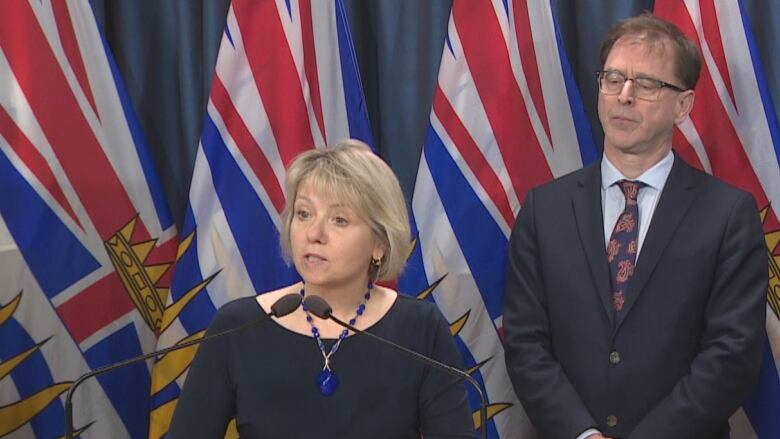Thousands of attendees at Vancouver dental conference told to self-isolate immediately
Dr. Bonnie Henry says at least 4 new cases of COVID-19 in B.C. related to Pacific Dental Conference

Nearly 15,000 people who attended a dental conference in Vancouver in earlyMarch have been told to self-isolate immediately by B.C.'s provincial health officer who said multiplecases of coronavirushave beentraced to the event.
On Monday, Dr. Bonnie Henry said 30 additional cases of COVID-19 havebeen confirmed in B.C.since Saturday, bringing the total in the province to 103.
Henry said at least four of those new cases are related to an infected person who attended the Pacific Dental Conference, held at the Vancouver Convention Centre March 5to 7.
Henry said cases of COVID-19 identified in other areas of the country havealso been traced back to the Vancouver conference.
- Stay informed by joining ourCBC Vancouver Facebook groupon coronavirus.
According to Vancouver Coastal Health, the initial person who has tested positive for COVID-19 attended the conference on March 6 between 2 p.m. and 4 p.m.
Henry saysanyone who attended the event must self-isolate for 14 days.
"They should not be at work. They should not be at school. They should not be around others," said Henry.
If symptoms develop, people are asked tocontact 811 or their health care provider. Only if symptoms are severe, such as shortness of breath or chest pain, should British Columbians call 911 or go to theEmergency Department.
Self-isolated individuals should not go to work, school, any public areas oruse public transport or taxis.
Vancouver Coastal Health issued a release on March 12 sayingthe risk to participants wasextremely low and attendees could continue to workas long as theydid not develop symptoms.
Henry reversed that advice with Monday's announcement.
Record attendance
Dr. David Ciriani, president of the Kamloops and District Dental Society, said the conference set records this year for attendance.
"Traditionally, attendance there is probably about, oh, just about 90 per cent of the dentists in the province," Ciriani said from his home, where he is now in self-isolation.
Ciriani and many of his colleagues are shutting down their offices, suspending elective proceduresand trying to find alternatives namely any dental staff who didn't attend the conference for patients who are dealing with severe pain or infection.
"The degree of dental services available across the province is going to be really curtailed," he said.
"This is uncharted territory for all of us."
Suspending services recommended
In a statement, the College of Dental Surgeons of British Columbia (CDSBC) said it recommendsall elective and non-essential dental services be suspended at once. Treatment for emergencies such as infection, acute pain and trauma can continue.
The CDSBCis asking all registrants to do a pre-treatment risk assessment with each patient, ideally by telephone, before performing any treatment. That assessment will be used to determine if there is any risk to the oral health provider, the patient or the public and if so, the patient will be referred elsewhere or the treatment postponed.
The CDSBC is also cancelling all in-person meetings and non-essential travel for staff.
Health authorities recommend self-isolation for 14 days and monitoringfor symptoms such as fever, cough and difficulty breathing.
If you have a COVID-19-related story we should pursue that affects British Columbians, please email us atimpact@cbc.ca.
With files from Jenifer Norwell













_(720p).jpg)


 OFFICIAL HD MUSIC VIDEO.jpg)
.jpg)



























































































